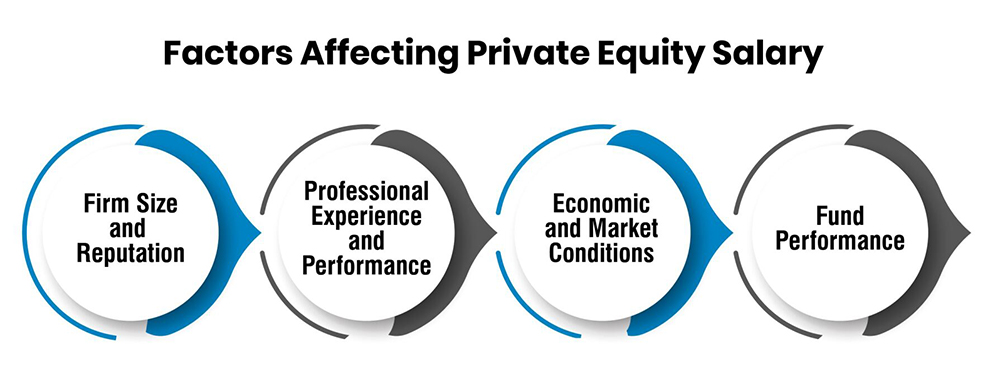Private equity is a source of choice for finance professionals looking for a well-paid job. If you are interested in how to get into private equity and in private equity salary, this guide will give you an overview of the compensation structure in private equity and how to move forward job-wise towards a satisfying private equity salary.
What is Private Equity?
Private equity (PE) is an alternative method of investment which involves the buyout of private or public companies making them free from the public stock exchange. PE firms can attract large amounts of capital from pensions and the Federal Reserve to invest in businesses with expansionary opportunities or those looking to restructure their business operations.
PE investments however are typically long-term holdings designed to enhance the performance of acquired companies and finally, result in a profit through selling them. PE firms frequently engage in the management of their investments, showing more active participation either through strategic decision-making or improvements of an operational area.
Those investment companies have been proven to be essential for the economy as they allow companies that cannot use traditional forms of investment to get funds. Therefore, it also adds value for investors through strategic investments and skilful management by making investments attractive and higher returns.
How to Get into Private Equity: A Detailed Roadmap
Getting into the private equity (PE) industry requires a rigorous strategy, which involves sensibility for data, networking, and through time, good learning. On the off chance that you are seeking answers on how to get into private equity, this supremely in-depth manual will be the perfect straight-forward route that you may need, to help you find your way through your career journey towards a successful PE job.
-
Gain Relevant Experience
Start with gaining practical knowledge in finance-related works such as Investment banking, Management consulting, or corporate finance. These roles put in touch with financial analysis, deal structuring, and due diligence which are the qualities needed to make oneself successful in Private Equity.
-
Develop Financial Acumen
In addition to the theoretical foundations of financial modeling, valuation methods, and investment analysis, create a solid approach for portfolio management. Knowing and analysing the financial health of a company as well as understanding the growth opportunities of the firm is quintessential for private equity.
-
Earn advanced degrees and certifications
Along with developing financial acumen, you must also consider an MBA credence to hone your talent and make you more attractive to prospective employers. These degrees and private equity certification can help you to be more job-ready, and they can be used to show employers how serious you are about continuing to learn more and improve your skill set.
-
Build a Strong Network
Joining industry events, becoming a professional association member and LinkedIn are among the effective ways to expand your network. They are developing connections with professional opportunities in physical education may bring along important pieces of knowledge, and even, open a door for future job opportunities.
-
Give an Example of Your Skills and Background
It is necessary to show your potential employers that you can become a part of their company by offering them the return value and other benefits of hiring you. List some milestones that you have triumphed over from successful business deals, financial restructuring assignments, and strategic projects that you have done, on your resume and interviews. Demonstrate your expertise to get on a private equity team—, your problem-solving techniques, and your leadership skills, to set you apart from the other candidates and show that you are the best fit for the position.
-
Stay Persistent and Patient
The path to private equity stardom often proves to be difficult and can take much effort to obtain success. Set yourself ahead and pursue your aspirations passionately while simultaneously working on your development and not missing out on chances that will give you an edge.
Private Equity Salary Structure
Depending on the type of private equity professional, they are usually compensated with a basic salary, often, with an annual bonus, and carried interest, which reflects the profit-oriented and financial incentive-rewarding environment of the private equity business.
- Base Salary: The basic salary of a private equity entry-level analyst may be around USD 135k – USD 155k. In contrast, a director’s or an equity partner’s yearly salary could be as high as USD 230k – USD 260k. Each firm has a salary structure that is decided upon by various factors like the job level, experience and the size and location of that firm.
- Annual Bonus: The year-end bonus offered by private equity is an integral part that is related to private equity funds as well as employees’ performance. Assistants' and Associates' earnings in the range of 100% to 150% of their basic account can be bonus-based. At the same time, senior professionals may receive bonuses surpassing their basic account based on the attitude of funds and deal-making success.
- Carried Interest: Capital gain is a portion of the profit a private equity business earns on its successful investments, which in turn is allocated to those senior investment professionals within the fund. This incentive puts to their selfish interest as well as that of the investor and they are very likely to receive a more lucrative employment on that basis. One of the ways carried interest differs between funds and from one professional to the next is that it is highly dependent on the fund’s performance and the manager’s level of importance to the company.
Factors Affecting Private Equity Salary
Many determining factors exist, which shape the remuneration levels in the private equity landscape, revealing the complexity of this industry, with several factors that influence the compensation packages. Knowing these factors can assist in determining ways how professionals can maximize their income in this sector which is always changing and developing.

- Firm Size and Reputation: The size and the scale of the company is a major factor in the determination of salaries. The established corporations with good performance in the past, and huge assets under management (AUM), usually offer initial salaries, bonuses, and the carried interest as high for the employees to attract and hold the best talent. On one hand, smaller companies or lesser-known firms may offer fewer compensation packages, although within them one may find the chance for fast advancement and becoming more powerful and competent.
- Professional Experience and Performance: The amount of money a person earns as a private equity professional is affected by their own experience. At the beginning of their private equity career, entry-level analysts and associates are usually compensated with lower base salaries and bonuses than mid-level or senior professionals who have strong financial know-how, deal-making skills, and successful past deals under their belts. The employees who perform in target and carry out the firm’s regular fabrics in a product or service good enough to ultimately receive high bonus payouts and carried interest are normally the top performer professionals in the industry.
- Economic and Market Conditions: The aggregate well-being of the economy and capital finance gives higher salaries to private equity fund managers. The extent of deal flow and performance is better during times of great economic growth or peak market performance in private equity. This can mean increased incomes for the professionals at the firms. On the other hand, the volume of business opportunities can dwindle, or they can become scarce during recession times or market instability. This may lead to less revenue on bonuses and carried interest payments.
- Fund Performance: Regardless of whether the fund is performing well or not, executives and fund professionals benefit from such performance. The investment crews that perform particularly well and deliver in return for the investors usually end up cashing in more in the form of additional bonuses and team bonuses stemming from the portfolio deals’ success. On the other hand, fund bosses with low performance may find their compensation affected negatively, as lower returns lower the bonus pool and limit the possibility of sharing carried interest.
Conclusion
In general, investing in capital and network development is a highly profitable job offer for those who have the skills and willingness to make the most of it. As one becomes well-versed in private equity salary and takes into cognizance the steps mentioned hereunder on how to get into private equity, a chance of making it in this field of competition considerably increases. Through determination, testing and getting knowledge of the trade and, most importantly, a smart network, the new generation of private equity experts can find access to the most interesting and profitable jobs and eventually make the companies they join victorious.







